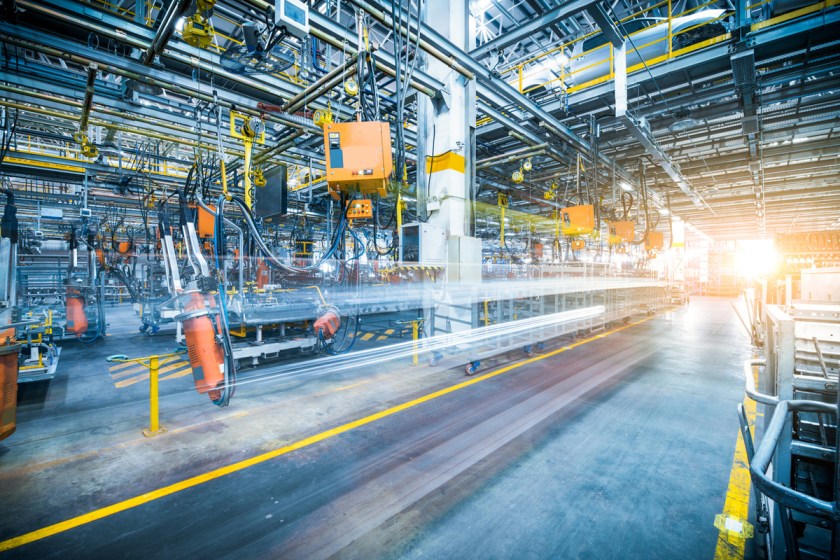The industrial machinery and components industry is undergoing significant change. The global pandemic forced many industrial manufacturers to rapidly transition to more digital operations, and it also played a role in shifting long-held perceptions of how technology can be used in the industry.
Source: Original Postress-this.php?">Industrial Manufacturers – Time To Deliver Value Not Products
“It’s actually the COVID-19 crisis that is driving digitalization for us, because it fosters the need to be more virtual and be more digital in everything that we do,” said George Kube, global vice president of industrial machinery and components at SAP during a recent industry webinar .” Several other major factors are pushing industrial manufacturers toward fundamental transformation.
“I see that this big shift is happening,” said Vishal Chaturvedi from IBM’s global industry team during a recent SAP radio show. “There are many start-ups coming up. There are pressures building up on the [traditional] industrial manufacturers who have been running [their businesses] in the conventional way.”
Gustavo Milan from the industrial machinery and components industry business unit at SAP agreed that the “industry is changing very much, and there is a need for improvements and innovation.”
The Shift Toward Digitalization
While the pandemic may have accelerated digitalization, this shift was already well underway in the manufacturing business.
Industrial machinery and components manufacturers have been gradually adopting intelligent technology and integrating it into their products, and using it to automate their factories and streamline their business processes throughout their organizations. Today, that digitalization transformation boosted by the pandemic continues.
“Customers are looking for ways to run their business today and support new business models,” said Umesh Kaul, an SAP enterprise architect for industrial manufacturing at IBM, during the industry webinar. “They want deep capabilities within the functions of finance, customer order, sales, but they also want to support new business models, and that requires new capabilities that span across functions from sales to manufacturing or shipping to billing. One area that's really interesting is applying artificial intelligence in customer-employed focus efforts, to create (the) best customer experience.”
Focus on the Customer: Personalization and Selling Outcomes Instead of Products
Industrial manufacturers are shifting their focus from selling products to selling solutions and even outcomes. They are really listening to their customers, identifying what each specific customer needs, and then configuring and creating the personalized solutions that address that need.
During the radio show, Henk Meeter at Echelon Solutions Group said, “it's very, very clear that things are transitioning. They’re transitioning from simply selling products to selling solutions … not just packaging services together with products. The key is actually being able to determine what the customer's need is because we want to sell outcomes. Those outcomes need to match to [the] customer’s needs. That's where we really need to focus on what I always call going outside in. Starting with a customer, working in toward the technical characteristics of the products or the services, or whatever it is that we're wanting to sell.”
Producing quality products is still critical, but now it is just one piece of the puzzle. Today’s customers expect great outcomes, which are a combination of good experiences and exceptional service that accompany quality products – personalized to their own needs.
It may sound like a tall order, but SAP’s Gustavo Milan said focusing on the customer is a key differentiator in industrial manufacturing these days.
“What we see in the industry today is that selling products is definitely no longer an advantage. Most of the OEMs [original equipment manufacturers] are facing an ever-challenging competitive market in which the threat of commoditization in the product level makes it no longer an advantage. Therefore, what I think is that OEMs need to focus on transitioning from that traditional selling equipment model to the solution selling model and bring kind of the next phase of growth. That will make a competitive differentiator for them.” He continued, “OEMs have to be able to bundle the physical equipment with the added value services, and that typically includes services contracts, subscription contracts, installation services, even consumable products and digital services and subscriptions. That’s the way in which we see the industry is moving forward.”
“I think we are talking about a game changer here,” agreed IBM’s Chaturvedi. “When you shift your focus completely to what a customer needs, or customer KPIs instead of selling your own products and services, it completely changes the game. If the industrial manufacturers can shift their vision towards focusing on what customers want, they can save a lot of money and they are set for a strategic differentiation … but it’s easier said than done.”
- 720p resolution View your favorite movies, shows...
- Alexa voice control - The Alexa Voice Remote lets...
- Fire TV experience built-in - Watch over 1 Million...
- Supports Apple AirPlay - Share videos, photos,...
- Supports HDMI ARC - Sends audio directly from the...
- 1080p High-Definition - Watch TV in crisp, clear...
- Full Array LED Backlight - Evenly distributed LEDs...
- IQ Picture Processor - Delivers superior picture...
- V-Gaming Engine Automatically optimizes picture...
- SmartCast - With intuitive navigation, enjoy...
That’s because there are challenges that come along with the transformation.
The Challenges and Opportunities of Digitalization
As industrial manufacturing companies consider digitalization of complex configurable solutions, they face challenges, but also potential opportunities in the areas of integration, collaboration, and data.
Integration across the entire value chain is critical in order to sell outcomes successfully and cost effectively. However, some industrial manufacturers are just starting to digitally engage with customers and partners directly through e-commerce platforms and networks. If there is no integration within organizations and across supply chains, there is no visibility or validation of data throughout the end-to-end processes. This leads to inaccurate information in different parts of the company, so it is essential that the configuration ordered is transferred seamlessly to the manufacturing, installation, and services teams. Connecting processes is critical to successfully sell outcomes.
Collaboration is key between sales, engineering, and manufacturing so sales reps can have accurate information when interacting with customers and have the ability to validate configurations, to provide estimates, assess risk, analyze profit margins, and plan accurate lead times.
Data collected from the smart equipment, intelligent business processes, and other sensors can provide a competitive advantage. Analyzing the data is important for industrial manufacturers to be able to accurately set price points to ensure profitability and to manage risk when companies are paid based on performance or outcomes. The data can also be used to provide additional services, such as benchmarking.
According to Milan, “Machinery with IoT technology inside is generating vast amounts of data, and the data itself has become a product in its own right. That means that manufacturing companies now need to involve a wider range of functions and areas within the company.”
The Future of Industrial Manufacturing
- SAMSUNG USA AUTHORIZED - Includes 2 Year Extended...
- Samsung 85 Inch DU8000 Crystal UHD LED 4K Smart TV...
- UHD Dimming | Auto Game Mode (ALLM) | Alexa...
- SAMSUNG TIZEN OS: Stream your favorite shows, play...
- BUNDLE INCLUDES: Samsung DU8000 Series 4K HDR...
- SAMSUNG USA AUTHORIZED - Includes 2 Year Extended...
- Samsung 75 Inch DU8000 Crystal UHD LED 4K Smart TV...
- UHD Dimming | Auto Game Mode (ALLM) | Alexa...
- SAMSUNG TIZEN OS: Stream your favorite shows, play...
- BUNDLE INCLUDES: Samsung DU8000 Series 4K HDR...
Industrial manufacturers should embrace digitalization in order to personalize solutions and sell outcomes going forward. To manage complex processes across different systems, organizations, and supply chains, artificial intelligence (AI) should be embedded into business processes to gain insights, predict outcomes, analyze risk, and improve the customer experience. Umesh Kaul said adding intelligence “is just the tip of the iceberg; a first glimpse to many possibilities for connecting your enterprise end-to-end and realizing your vision for an agile business model.”
Milan added, “As the pandemic has definitely accelerated the future of [the] customer experience, manufacturing companies that embrace digitization and embedding intelligence across the end-to-end lead-to-cash process are more likely to grow their revenue.”
Watch the SAP Industries Live 2021 webinar and listen to the SAP radio show to learn more about the opportunities and challenges of new business models in the industrial manufacturing industry.





